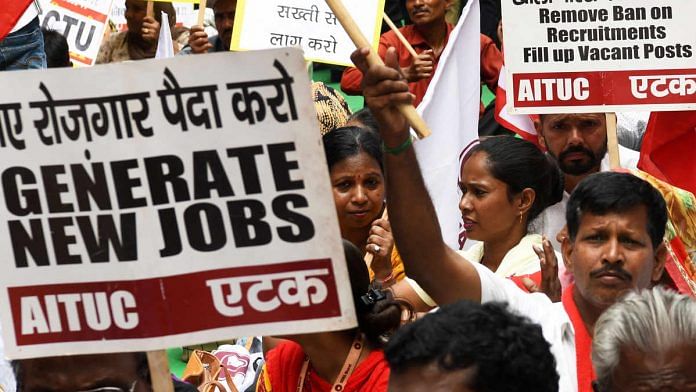New Delhi: The labour ministry has flagged concern over the slew of changes in the labour laws of various states, saying such changes are not “in sync with the labour law codes proposed by the Centre”, ThePrint has learnt.
In a communication sent to labour ministers of some states last week, the ministry has said states cannot abolish labour laws in the name of reforms because India is a signatory to the International Labour Organisation (ILO) and a few of the changes are against ILO conventions.
“It has been communicated to the states that complete suspension of labour laws is not in accordance with the Centre’s commitment to ILO conventions. The Centre is committed to protect the interest of the workers. Reform does not mean complete suspension of laws,” an official of the labour ministry told ThePrint.
The official didn’t specify which states were sent the communication.
Also read: How Modi govt’s labour law changes hope to raise India’s ‘Ease of Doing Business’ ranking
Labour law changes by states
In the past few weeks, several states have moved to amend their labour laws ahead of restarting economic activities after the Covid lockdown.
States such as Uttar Pradesh, Maharashtra, Rajasthan, Gujarat, Goa, MP, Uttarakhand, Assam, Punjab, Haryana and Himachal Pradesh have increased the working hours from 8 to 12 hours.
Uttar Pradesh, however, later withdrew the order of 12-hour shift for workers following a notice from the Allahabad High Court. Rajasthan also followed suit.
While Uttar Pradesh and Madhya Pradesh scrapped key labour laws for the next three years, Gujarat did the same for 1,200 days.
In MP, factory licence will now be required to be renewed only once in 10 years instead of annually. Also, MSMEs (micro, small and medium enterprises) will be able to hire labourers according to their requirement to increase productivity.
In UP, only three labour laws will be applicable in the state for the next three years apart from provisions related to children and women in the suspended laws. The three include the Building and Other Construction Workers Act, 1996, Workmen Compensation Act, 1923, and the Bonded Labour Act, 1976.
The ministry official quoted above said UP, MP and Gujarat have sent their ordinances to the President for approval, and the latter has sought the labour ministry’s response on the ordinances.
“The ministry is firming its response to be sent to the President,” he added.
‘Centre has to ensure rights of workers are protected’
A second ministry official said the Centre is of the view that uniform regulation of labour laws across the country will offer flexibility to new and existing business.
“We understand the states’ urgency to amend laws to attract investments and revive economic activities after lockdown but the Centre has to ensure that the rights of workers are protected. We have to tread carefully,” he said.
“There are several loopholes in the states’ ordinances and it can be challenged in the court easily. It is necessary to take legal views before giving an opinion for approval, but one thing is clear there can’t be multiple state (labour) laws to confuse investors. There should be uniformity in laws,” he added.
Elaborating about how ordinances can be challenged in courts, the official said, for instance, MP has proposed detailed changes in labour laws, but changes introduced by UP and Gujarat are generic and not specified.
“They can be challenged in court due to lack of clear interpretation,” he said.
Labour is a concurrent subject with both states and the Centre having the power to enact laws but if there is any conflict between central and state laws, central law is expected to prevail, said the official.
The Modi government last November had introduced Labour Code on Industrial Relations, 2019, bill in the Lok Sabha.
The industrial relations code is the third of the four labour codes that got Cabinet nod.
The code on wages was approved by Parliament in August last year, while the other codes that are in various stages of drafting and approval include the code on social security and the code on occupational safety, health and working conditions code 2019.
ILO appeal to Modi
The ILO, meanwhile, has appealed to Prime Minister Narendra Modi with regard to the proposed labour law amendments by the states.
This came after a complaint by 10 central trade unions earlier this month, objecting to the labour law changes.
“Please allow me to assure you that the ILO Director-General (Guy Ryder) has immediately intervened, expressing his deep concern at these recent events and appealing to the Prime Minister (Narendra Modi) to send a clear message to Central and State governments to uphold the country’s international commitments and encourage engagement in effective social dialogue,” Karen Curtis, ILO’s Chief of Freedom of Association Branch under the International Labour Standards Department, said in a letter to trade unions on 22 May.
Also read: ‘Can’t allow jungle raj’ — RSS wing says UP, MP labour law changes bigger pandemic than Covid




The Labour ministry is taking the correct view. If labour laws need to be amended to allow employers more flexibility in hiring and firing, that should come from a substantive dialogue with all stakeholders. Not these Ordinances rushed through at a time when the working class – in both the organised and unorganised sectors – is facing a tsunami of distress. In any case, for serious job creation to take place, states like UP and MP will have to do a lot more on infrastructure and other fronts as well. It is also true that some of the rights like an eight hour working day have been secured by workers after long periods of exploitation. ILO’s concerns are justified.
Advisory appears just to convince ILO else the government should have acted immediately when the amendments were announced. Still doubtful if the intent is to ensure compliance of labour laws or just a paper work with leeway to states to go ahead with modifications in name of reforms.